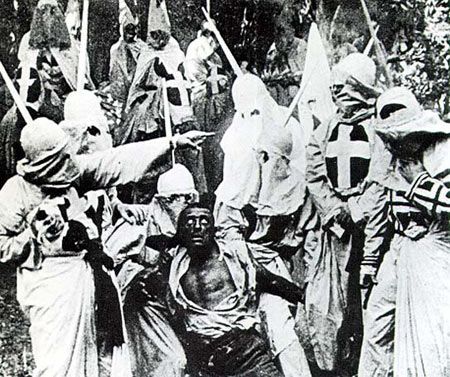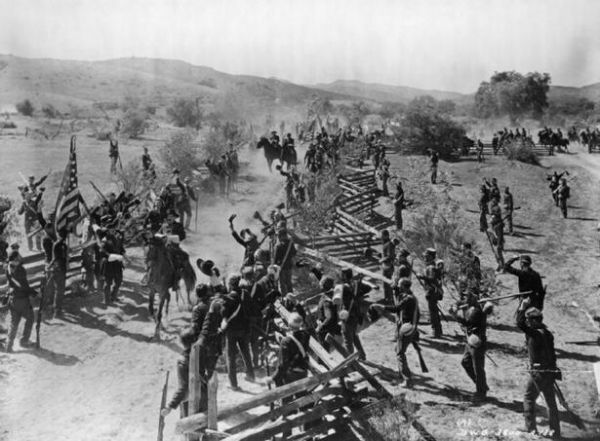 |
| Hide yo' kids, hide yo' wives. |
The
Birth of a Nation
1915
Director: D.W. Griffith
Starring: Lillian Gish, Mae Marsh, Henry
B. Walthall, hundreds upon thousands of extras
I
will tell you this from the outset: I have precious little original content to
say about The Birth of a Nation. My
opinion of this film is fairly similar to that of pretty much everyone
else. You won’t be gleaning anything
terribly new here.
So…
let’s get this started, shall we?
The
Birth of a Nation
is about arguably the most violent and disruptive of decades in American
history, the 1860s. We get an
introduction to two families – the Camerons of the South and the Stonemans of
the North – right before the American Civil War breaks out. The first third or so deals with the war,
then later we see Lincoln’s assassination.
The final portion of the film deals with the South after the war, about
rebuilding and reconstruction, and, in what is so ridiculously troubling, about
the rise of the Ku Klux Klan.
I’ll
start with the good, because there is good to say about this film. The Birth of a Nation is often
credited with “inventing the language of film,” and it would be difficult to
argue with this statement. I’ve seen a
few films made prior to this, and I’ve seen another film from the same year as
this (Les Vampires). D.W.
Griffith did not invent the concept of the “epic film,” (Les Vampires is even
longer than Nation’s three hour running time), but he certainly took the
concept of film to a much higher level.
Unlike Les Vampires, which feels like a filmed play, Nation
has crosscuts, close-ups, intercutting, flashbacks, and even a bit of a moving
camera. Griffith defines what makes a
movie different from a play with The Birth of a Nation. While this might not be apparent to a
thoroughly modern movie-goer, it’s apparent by watching the other films of the
1910s that Nation was a game-changer.
The “language of film” gets a vocabulary lesson.
And
yet.
Why,
oh why were such inventive film techniques brought to us through such a
stomach-churning story? The first hour,
the one that focuses mostly on the Civil War, is fine enough, establishing many
classic war movie tropes in one go. Even
the fact that Griffith tells the story from the vantage point of the South (his
father was an officer in the Confederate Army), sympathizing them while
brutalizing the North, is fine. But once
the Civil War ends we are treated to some of the most ludicrous racial
stereotyping nonsense, so horrible that I have trouble getting through it. The black characters in the film (most of
whom were played by white actors in blackface) are nearly all portrayed as
lascivious, lawless, power-hungry beasts who will beat the white men into
submission while marrying all the white women.
And the only possible way the white race can save itself? The Ku Klux Klan. Don’t worry, white women, the KKK will save
you!
I
don’t even…
I
rewatched most of this film in order to write this review, even though I knew
what I wanted to say. I admit, I had
forgotten just how archetypal the Civil War sequence is, how influential it was
on war films, and that’s worth noting.
Griffith portrays the jubilation of the South heading off to war, the
chaotic frenzy of the battlefield, followed by the despair of returning home to
a ruined homeland, all formidably portrayed.
While All Quiet on the Western Front certainly portrays the
disillusionment with war with greater sophistication, there is a similar sense
here. So I am glad that in watching this
again, I remembered this portion of the film I had forgotten.
But
then the film gets silly and the racial absurdities become too many to name,
and I feel my stomach literally turning over.
And then our “hero” (Walthall) gets “inspired” to invent the KKK, and my
patience is significantly shortened. I
just can’t. Knowing how much intolerance
and bigotry this particular organization has inflicted in the last century in
America, how much violence and hatred it has instilled, how its effects are
undoubtedly still felt in some areas of the American South, I can’t see them as
any type of hero. Griffith claims to
have been blind to what he was doing, and he was, apparently, legitimately
surprised when people took issue with his portrayal of race relations. I just don’t get it. How could he not know what he was doing?
I
had to stop watching. I couldn’t make it
through the final half hour. I was
impatient, disturbed, and frustrated. I
was NOT going to watch the KKK save the day.
I couldn’t.
The
Birth of a Nation
is troubling. It advanced the art of
filmmaking by light years, but it did so by telling an utterly reprehensible
story. I would never recommend anyone
see this unless they needed to for a class or if you’re a list completist. I get no sense of pleasure from watching this
movie. I respect what Griffith did in
terms of filmmaking techniques, but after that, this one gets a resounding “NO”
from me.
Arbitrary
Rating: 3/10. It scrapes a few points
for technical merit.

